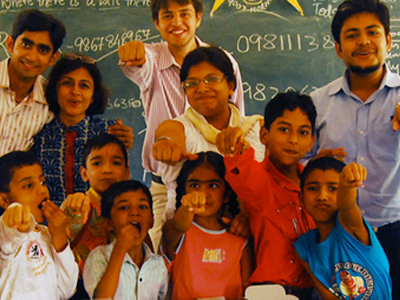InspirED

By Anthony Jackson
MUMBAI, September 6, 2011—The InspirED conference brought together teachers, school leaders, and experts from academic and non-governmental organizations to exchange best practices and to draw inspiration from innovations in teaching and school reform in India and throughout the world. Here are some lessons inspired by this conference.
The conference, which draws educators primarily from greater Mumbai, has nearly doubled in size from its first year. Plenary and workshop presentations ranged from effective approaches to mathematics instruction to how the U.S. charter school model could be introduced in India.
Among the participants were a large group of teachers involved in the Teach for India program. Teach for India is modeled after Teach for America, and is now in its second full year. The organization places about 150 recent Indian college graduates for two-year assignments in primary schools serving poor and underserved students. The teachers come from top Indian universities as well as prestigious colleges in the United States, the United Kingdom, and elsewhere. Teach for India provides opportunities for these young people potentially en route to a career in education but, more likely if they go the way of their American counterparts, will serve as informed advocates for high-quality education within other areas of civic life.
Steve Farr, Chief Knowledge Officer for Teach for America, noted in his keynote address that despite the vast difference in scale—India has nearly four times more students than the States—both countries are plagued by school systems that fail to provide high-quality education to enormous numbers of children from low-income families. While South Central Los Angeles (where Farr was stationed for his Teach for America assignment) presents different challenges than the slums of Mumbai, they share the common need for well-educated, enthusiastic teachers to support learning and hopefully spark systemic change.
Teach for India is not without controversy. Unlike in the United States, Teach for India teachers are paid by the organization itself. Particularly in rural areas outside of Mumbai, the stipend these teachers receive, while modest, is often more than teachers in the same schools and often nearly as much as the school leader, an obvious potential cause of resentment. Also, some Indian educators expressed concern that the initial training provided to Teach for India teachers in the summer before they enter the classroom is insufficient to provide high-quality instruction, a critique leveled at the Teach for America program since its inception nearly two decades ago.
My plenary and workshop presentations at the InspirED conference focused on global competence as a way of describing the knowledge, understanding, and capacities students need to be successful in the 21st century global, economic, and civic environments. My intent, in part, was to see how well our definition of global competence, described in Educating for Global Competence: Preparing Our Youth to Engage the World (download) resonates with Indian educators. It appears from this discourse, at least, that the answer to the title of my talk, “Is Global Competence a Universal Concept?” is a resounding yes. Indian educators’ views on what students need to know and be able to do in today’s interrelated world are well-aligned with global competence, which is defined as the ability to investigate the world, weigh perspectives, communicate ideas, and take action to improve conditions within and across cultures.
However, when we examined student work, the Indian educators brought a different perspective on what constitutes evidence of global competence than I had heard expressed by American teachers about the same work. For instance, a student designs a visual memorial to the victims of the atomic bombing of Hiroshima and Nagasaki, which he envisions being installed in Japan, to honor the lives lost, and in the United States, to recognize the consequences of our actions. In discussions among American educators, the work is often considered evidence of global competence, especially in the use within the memorial of first-person accounts of survivors as an example of weighing perspectives. Yet the Indian educators noted that perhaps Japanese citizens today do not wish or need to be reminded of the bombings. Had the student really considered the contemporary Japanese viewpoint on the issue? A question well worth asking, and a reminder that, ultimately, the development of global competence for students and educators requires the kind of honest, open dialogue that meetings such as the InspirED conference can provide.
The InspirED conference took place on September 3-4, 2011, in Mumbai. Five hundred educators gathered at the American School of Bombay. The conference was co-convened by Asia Society India, the Akanksha Foundation, and Teach for India.
